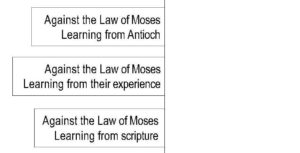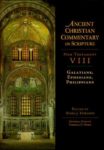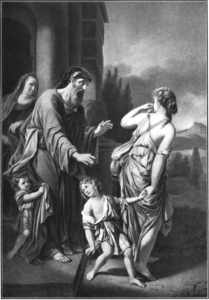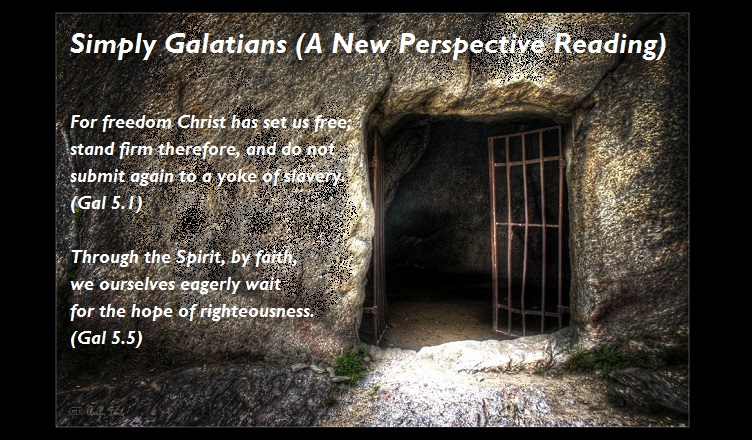From Galatians 4

The Early Perspective on Paul placed a good deal of emphasis on the story of Israel as setting the context for the gospel. In this chapter Paul gives several reasons why the Galatians ought not to go back to the works of the law. He says the law anticipates the coming of the Christ and warns its listeners by way of analogy not to go back to slavery.
This post is part of my Simply Galatians series.
Passage and Comments
As a reminder of the context, as mentioned in my Introduction, Paul has heard the Gentile Christians were again observing various festivals and sabbaths commanded in the law of Moses and were considering circumcision.
This behaviour leads Paul to question if they have now gone after another gospel. Which is why Paul has written this letter. To stop them living according to the law of Moses and live by faith in Christ.
I have highlighted in the First Post Paul and Peters common understanding of the gospel.

Paul and Peter both believed the gospel is the story of Jesus (life, death, resurrection, appearances and coming judgment) which declares him Lord and Christ. Their gospel is in accordance with the Old Testament promises and prophecies that anticipate Christ’s coming.
The Second Post considers the implications of this Gospel for Gentile believers.

The chief implication relevant to Galatians is that Jesus in the gospel has introduced a new covenant for the people of God. The law of Moses was given to the Jews and part of the old covenant era. Jesus has inaugurated the new covenant, and consequently a new way to live as God’s people (Jews and Gentiles).
The righteous now live through the Spirit, by faith and love. This means the righteous are not longer identified by their observance of the works of law, rather by faith in Christ. This includes believing Gentiles as part of the covenant people of God.

In this second post we saw Paul argue against observance of the law of Moses by describing his confrontation with Peter in Antioch where Peter gave the impression Gentiles had to observe the works of law and become Jews.
In the Third post Paul reminds the Gentiles in Galatia of their initial hearing of the gospel and experience of the Spirit and uses these to explain the ineffectiveness of the law of Moses to produce righteousness and life. Instead through faith and the Spirit they are to think of themselves as sons who have come of age and part of God’s worldwide redeemed family.
In our post today Paul gives more reasons why the Gentiles in Galatia should not observe the law of Moses.
Gal 4.1-7
4 I mean that the heir, as long as he is a child, is no different from a slave, though he is the owner of everything, 2 but he is under guardians and managers until the date set by his father. 3 In the same way we also, when we were children, were enslaved to the elementary principles of the world.
4 But when the fullness of time had come, God sent forth his Son, born of woman, born under the law, 5 to redeem those who were under the law, so that we might receive adoption as sons.
6 And because you are sons, God has sent the Spirit of his Son into our hearts, crying, “Abba! Father!” 7 So you are no longer a slave, but a son, and if a son, then an heir through God. (Gal 4.1-7)
‘Heir’, ‘slave’, ‘guardians’, ‘father’. Paul alludes to a common Greek practice where a guardian (Gk. paidagōgos) or slave was charged by the master with escorting his sons to school and back so that they would not get into trouble. They were needed for a limited time before the young charge came of age.
‘We’, ‘When we were children’. To be noted is the fact that Paul does not use this analogy as a definitive mark of distinction between ‘before Christ’ and ‘after Christ’, or between committed believer and non-believer (Dunn, Galatians). Paul refers to their former lives under the law of Moses. He as a Jew. The Galatians as god fearers.
‘Enslaved’, ‘Under the law’. Paul alludes to their Galatians former servitude to the law of Moses (elementary principles of the world) as a form of slavery. Being under the care and control of this guardian suggested they too were slaves. Though when they came of age they would inherit everything and stand over all those in the house.
We see this in the early church father Ambrosiaster (c.e. 366-384).

‘Elementary principles’. By the “elements” he means new moons and the sabbath. New moons are the lunar days that the Jews observe, while the sabbath is the day of rest.
Therefore, before the promise came (that is, the gift of God’s grace) and justified believers by purifying them, we were subject, like those who are infants and imperfect, to our fellow servants as though to custodians. Our pernicious freedom was the matrix of sin. (Ambrosiaster, Epistle To The Galatians 4.3; Edwards, M.J. ed., 1999. Galatians, Ephesians, Philippians, Downers Grove, IL: InterVarsity Press.)
‘Spirit of his Son’. This coming of age however was not necessary. Paul speaks of the redeeming work of Christ, which took them out of this servitude. Paul doesn’t say it here but Jesus did this through his death on the cross (cf. Gal 3.13).
God adopted them as his sons. He adopted them by giving them the Spirit of his Son (Jesus Christ) which enabled them to call out ‘Abba Father’ (cf. Rom 8.15-16). The most intimate of expressions communicating love, honor and respect.
You are no longer a slave, but a son and heir.
Tom Wright has suggested Paul has in mind the Exodus narrative.

Paul is here telling the story of Israel in slavery, and of how she attains her freedom. The background model for this is the exodus, the time when YHWH revealed himself in a new way to Israel. The foreground is the return from exile, when Israel, after her Babylonian and other bondage, is finally rescued, again in a great revelation of YHWH’s sovereign and saving power. In both cases, this revelation of YHWH functions as a demonstration of the inadequacy and shabbiness of the pagan gods, Egyptian in the one case and Babylonian in the other.
Paul, in telling the story of how this redemption has actually been achieved, awakens echoes of both stories. He is clearly retelling the story of how the one true God has rescued a people for himself. But, as he tells it, the story comes out this time in a threefold form. The one true God sent his Son; then he sent the Spirit of his Son. The result (verses 8-11) is that these redeemed people now truly know the true God, or rather have been known by him; in other words, this Father-Son-Spirit combination is the true revelation of who the one true God is, which puts all other claimants to deity in the shade. (p72, Wright, What Saint Paul Really Said)
| Exodus | Galatians 4.3-7 |
| Slavery in Egypt | Slavery to the Law (Gal 4.3-4) |
| Israel God’s firstborn Son | Adopted as Sons, Abba Father (Gal 4.5-6) |
| Israel led by the Spirit | Spirit of his Son in hearts (Gal 4.6) |
Gal 4.8-10
8 Formerly, when you did not know God, you were enslaved to those that by nature are not gods. 9 But now that you have come to know God, or rather to be known by God, how can you turn back again to the weak and worthless elementary principles of the world, whose slaves you want to be once more? 10 You observe days and months and seasons and years! 11 I am afraid I may have labored over you in vain. (Gal 4.8-10)
‘How can you turn back again?’, ‘Days, Months, Seasons and Years’. Paul’s continued references to the law of Moses in Galatians and the surrounding context of this passage (Gal 4.1-7, 21-31) strongly suggest he has the calendar observances of the law in mind here. Paul at times does refer to the Sabbath as a ‘day’ (e.g. Rom 14.6), highlighting he doesn’t have to explicitly say ‘Sabbath’ in order to speak of it in the shorthand.
This is why Paul has written the letter in the first place and why he is so distressed with their behaviour.
They again observe the works of law (Gal 3.1-6) which includes the Sabbath and yearly festival observances. They are even going so far as to consider circumcision at the request of others (Gal 5.2; 6.13).
‘Enslaved to those who are not gods’, ‘Weak and worthless elementary principles of the world’. A number of interpreters (e.g. Longenecker, Dunn, Wright, Schreiner), perhaps even the majority, have concluded that ta stoicheia tou kosmou refers to spiritual powers of some sort. The options, broadly defined, range from star deities, to demons, to angels of the nations or local tribal and national deities. … From Second Temple Judaism there comes ample evidence of speculation about the universe and how the heavenly bodies were related to angels. … Paul in Galatians 3:19 says the Law of Moses was ‘ordained through angels,’ thus connecting the law of Moses with intermediary spiritual beings (Dictionary of Paul and his Letters, Elements/Elemental Spirits of the World).
The expression ‘elementary principles’ is mentioned previously in Gal 4.3, Paul associates their former observance of the law of Moses with paganism (Schreiner, Galatians, and notable others). This is a huge statement about law observance and very hard to believe for some, because of Paul’s other statements regarding the law (e.g. Rom 7.12,14). Again, Paul’s continued references to the law of Moses in Galatians and the surrounding context of this passage (Gal 4.1-7, 21-31) strongly suggest he has the calendar observances of the law of Moses in mind here.
“4. The Elements as Spiritual Powers: A number of interpreters, perhaps even a majority, have concluded that ta stoicheia tou kosmou refers to spiritual powers of some sort. The options, broadly defined, range from star deities, to demons, to angels of the nations or local tribal and national deities. … From Second Temple Judaism there comes ample evidence of speculation about the universe and how the heavenly bodies were related to angels. … Paul refers in Galatians 3:19 to the Law being ‘ordained through angels,’ he may be suggesting that the implication of the Judaizers’ message (which may have emphasized the glory of the giving of the Law at Sinai with the accompaniment of angels) is that, rather than understanding Israel to be ultimately God’s own possession, the means through which he would bring all nations to himself, they in effect placed Israel back under the intermediate superintendence of an angelic power” (Dictionary of Paul and his Letters, Elements/Elemental Spirits of the World)
Jerome says of this passage;

Now these same elements that he has now styled “weak and beggarly” he called above merely the “elements of the world.” … And so I think that so long as someone is an infant … he is subject to the elements, namely, the law of Moses. But when after [receiving] the freedom due to an heir he reverts again to the law, desiring to be circumcised and to follow the whole letter of Jewish legal illusions, then those things that were merely the elements of the world to him before are now said to be “weak and beggarly elements.” … The law of Moses, which before was rich, affluent and illustrious, became after Christ’s advent and in comparison with him “weak and beggarly.” … The “weak and beggarly elements” are those unworthy traditions of the Jews, which interpret according to the letter. They were poor excuses for interpretations and “commandments that were not good.” (Jerome, Epistle to the Galatians 2.4.8–9; Edwards, M.J. ed., 1999. Galatians, Ephesians, Philippians, Downers Grove, IL: InterVarsity Press.)
Gal 4.12-20
12 Brothers, I entreat you, become as I am, for I also have become as you are. You did me no wrong. 13 You know it was because of a bodily ailment that I preached the gospel to you at first, 14 and though my condition was a trial to you, you did not scorn or despise me, but received me as an angel of God, as Christ Jesus. 15 What then has become of your blessedness? For I testify to you that, if possible, you would have gouged out your eyes and given them to me. 16 Have I then become your enemy by telling you the truth?
17 They make much of you, but for no good purpose. They want to shut you out, that you may make much of them. 18 It is always good to be made much of for a good purpose, and not only when I am present with you, 19 my little children, for whom I am again in the anguish of childbirth until Christ is formed in you! 20 I wish I could be present with you now and change my tone, for I am perplexed about you. (Gal 4.12-20)
“Become as I am’. Chrysostom (c.e. 349–407) helpfully explains Paul’s meaning here.

[Paul] brings himself to the fore, persuading them on this ground also to depart from the ancient ways. “For if you have no one else as a paradigm, it is enough simply to look at me as an instance of this change, and you will easily be encouraged. Consider then: I also was in this state and burned with great zeal for the law, and yet later I was not afraid to discard the law and depart from that way of life.” (John Chrysostom, Homily On Galatians 4.12)
‘Bodily ailment’, ‘Gospel’. Paul refers to the time they first met when he preached the gospel to them. He remembers it fondly. But things have changed. Now he is perplexed and deeply concerned.
What would you original teachers and mentors think of you now?
‘They make much of you’. These are the Judaizers who have come and tried to turn the Galatians back to Judaism. They have treated the Galatians with seeming respect (‘much of you’), but Paul believes all they really want is that they be the ones high esteemed.
Gal 4.21-31

21 Tell me, you who desire to be under the law, do you not listen to the law? 22 For it is written that Abraham had two sons, one by a slave woman and one by a free woman. 23 But the son of the slave was born according to the flesh, while the son of the free woman was born through promise.
24 Now this may be interpreted allegorically: these women are two covenants.
One is from Mount Sinai, bearing children for slavery; she is Hagar. 25 Now Hagar is Mount Sinai in Arabia; she corresponds to the present Jerusalem, for she is in slavery with her children.
26 But the Jerusalem above is free, and she is our mother. 27 For it is written,
“Rejoice, O barren one who does not bear; break forth and cry aloud, you who are not in labor! For the children of the desolate one will be more than those of the one who has a husband.” (Isa 54.1)
28 Now you, brothers, like Isaac, are children of promise. 29 But just as at that time he who was born according to the flesh persecuted him who was born according to the Spirit, so also it is now.
30 But what does the Scripture say? “Cast out the slave woman and her son, for the son of the slave woman shall not inherit with the son of the free woman.”
31 So, brothers, we are not children of the slave but of the free woman. (Gal 4.21-31)
‘Under the law’, ‘Listen to the law’. This is one important verses which highlights Paul does not think of the law as simply a set of commands and rules. As mentioned previously Paul’s understanding of the law consists of a narrative which contains commands by which Israel was to submit. The Galatian Gentiles want to put themselves under the law of Moses. Under its dominion and influence. Paul refers to a portion of the law from Genesis. The story of Hagar and Sarah, Abraham’s two wives.
‘Present Jerusalem’, ‘Jerusalem above’. While the Genesis story happened a long time ago, Paul’s reference to the ‘present Jerusalem’ tips us off that he is thinking about the present state of affairs with the Judaizers.
The allegory describes the present state of affairs between the Judaizers and Paul.
|
Abraham |
|
| Hagar Covenant | Sarah Covenant |
| Slave woman | Free woman |
| Ishmael (‘flesh’) | Isaac (‘promise’) |
| Present Jerusalem | Jerusalem above |
| Born according to the flesh | Born through promise |
| Children for slavery | Children of the promise |
| Judaizers (Old Covenant) | Paul (New Covenant) |
‘Children for slavery’, ‘Children of the slave’. Throughout the letter Paul’s understanding of righteousness and covenant have familial overtones. The Judaizers are following Paul around (Acts 17.13) and otherwise doing their best to win people to their way of thinking with their false ‘gospel’ (Gal 1.6-9). Their ministry is sadly winning over some.
Paul refers to these Judaizers as the slave woman, their ministry as ‘persecution’ (Gal 4.29) and their converts as ‘children for slavery’ who are ‘born according to the flesh’ (McKnight, Galatians). He understands coming under the law of Moses as a form of slavery.
‘Flesh’. This is the second instance, the previous in Gal 3.3-5 where Paul refers to the flesh. Again he associates the flesh with the old covenant which the Judaizers were preaching.
But Paul wants the Galatians to think they are part of a different family.
‘Son of the free woman’, ‘Children of promise’, ‘children of the desolate one’. Paul wants the Galatians Gentiles to realise who they are in Christ. They are children of the promise, born to a barren woman who had been promised a multitude of children. If they realise who they are in Christ and who the Judaizers are they will know why they ought to resist the false gospel including the law of Moses.
Words for Believers

Paul’s understanding of sonship means that we have been set free from the curse of the law. We have moved from the Old Testament faith to the New Testament faith. No longer do God’s people need the law of Moses to direct their lives. We are being led by God’s Spirit.
We are sons of God because Christ, the Son of God, has made us part of his family by dying on our behalf.
But is this where we are now? In the Galatians case their good beginning has deteriorated into a bad situation. Despite believing in Jesus through the gospel, they have reverted back to their former ways of Judaism and works of law.
Have you reverted back to your former practices before coming to faith?
Click here to go to the next post in the series.
Copyright © Joshua Washington and thescripturesays, 2017. All Rights Reserved.





